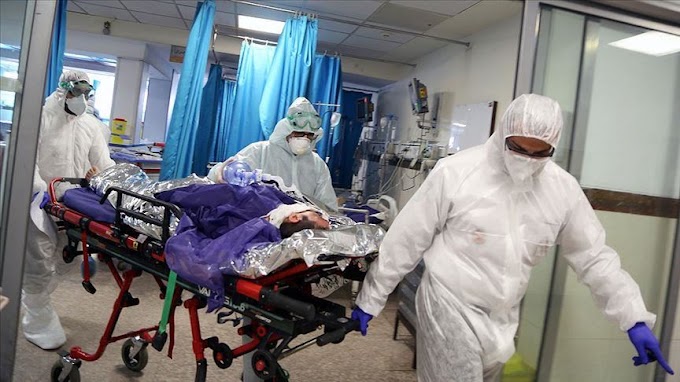
What is a coronavirus? What is COVID-19?
Coronaviruses are a large family of viruses that can be pathogenic in humans and animals. It is known that in humans, several coronaviruses can cause respiratory infections ranging from the common cold to more serious illnesses such as Middle East Respiratory Syndrome (MERS) and Severe Acute Respiratory Syndrome (SARS). The last coronavirus that was discovered is responsible for coronavirus disease 2019 (COVID-19).
What is COVID-19?
COVID-19 is the infectious disease caused by the last coronavirus that was discovered. This new virus and disease was unknown before the outbreak in Wuhan, China, in December 2019.
What are the symptoms of COVID-19?
The most common symptoms of COVID-19 are fever, fatigue, and a dry cough. Some patients experience pain, nasal congestion, runny nose, sore throat or diarrhea. These symptoms are generally mild and appear gradually. Some people, although infected, have no symptoms and feel good. Most (around 80%) people recover without needing any special treatment. About one in six people with the disease have more severe symptoms, including dyspnea. Seniors and those with other health conditions (high blood pressure, heart problems or diabetes) are more likely to have severe symptoms. Anyone who has a fever, coughs, and has trouble breathing should see a doctor.
How is COVID-19 spread?
COVID-19 is transmitted by people with the virus. The disease can be spread from person to person through respiratory droplets expelled from the nose or mouth when a person coughs or sneezes. These droplets can be found on objects or surfaces around the person in question. You can then get COVID-19 if you touch these objects or surfaces and then touch your eyes, nose or mouth. COVID-19 can also be acquired by inhaling droplets from a sick person who has just coughed or sneezed. That’s why it’s important to stay more than a meter away from a sick person.
WHO is reviewing the ongoing research on how COVID-19 is spread and will continue to communicate the updated results.
Is the virus responsible for COVID-19 transmissible by air?
Studies to date suggest that the virus responsible for COVID-19 is primarily transmissible through contact with respiratory droplets, rather than by air. See response to previous question, "How does COVID-19 spread?" "
Can you get COVID-19 from someone who has no symptoms?
The disease is spread mainly by respiratory droplets expelled by people who cough. The risk of getting COVID-19 from someone who has no symptoms is very low. However, many people have only mild symptoms. This is especially true in the early stages of the disease. It is therefore possible to contract COVID-19 from someone who has, for example, only a mild cough but who does not feel sick. WHO is reviewing the ongoing research on the transmission time of COVID-19 and will continue to report updated results.
Can I get COVID-19 through contact with a sick person's feces?
The risk of getting COVID-19 from contact with the feces of an infected person appears to be low. Initial investigations suggest that the virus may be present in the feces in some cases, but the outbreak does not spread mainly through this route. WHO is reviewing ongoing research on how COVID-19 is spread and will continue to communicate the new results. However, as the risk exists, it is an additional reason to wash your hands regularly, after using the toilet and before eating.
How can I protect myself and prevent the disease from spreading?
Protective measures for all
Stay up to date with the latest information on the COVID-19 outbreak, available on the WHO website and from national and local public health authorities. COVID-19 has occurred in many countries and several countries have been affected by outbreaks. In China and some other countries, authorities have managed to slow or halt the spread of the outbreak. However, the evolution of the situation is unpredictable and you must therefore keep yourself regularly informed.
You can reduce the risk of becoming infected or spreading COVID-19 by taking a few simple precautions:
Wash your hands frequently and thoroughly with a hydroalcoholic solution or with soap and water.
Why ? Washing your hands with a hydroalcoholic solution or soap and water will kill the virus if it is on your hands.
Maintain a distance of at least one meter from other people who cough or sneeze.
Why ? When a person coughs or sneezes, it projects small droplets that may contain the virus. If you are too close, you can inhale these droplets and therefore the virus responsible for COVID-19 if the coughing person is a carrier.
Avoid touching your eyes, nose and mouth.
Why ? The hands are in contact with many surfaces that may be contaminated with the virus. If you touch your eyes, nose or mouth, the virus can enter your body and you can get sick.
Make sure you follow the rules of respiratory hygiene and that people around you do the same. In case of coughing or sneezing, cover the mouth and nose with the crease of the elbow, or with a handkerchief and throw the handkerchief immediately after.
Why ? Respiratory droplets spread viruses. By respecting the rules of respiratory hygiene, you protect people around you from viruses such as those responsible for colds, flu or COVID-19.
If you're not feeling well, stay home. In case of fever, cough and dyspnea, see a doctor after calling it. Follow the instructions of the local health authorities.
Why ? The national and local authorities have the most recent information on the situation in the region where you are. If you call them, your doctor can quickly refer you to the most suitable health establishment. It will also protect you and prevent the spread of viruses and other infectious agents.
Stay informed to find out which cities or areas where COVID-19 is spread on a large scale. If possible, avoid traveling, especially if you are elderly, diabetic, or have heart or lung disease.
Why ? The risk of contracting COVID-19 is higher in these regions.
Protective measures for people who are or have recently visited (within the past 14 days) in areas where COVID-19 is spread.
Follow the advice presented above (Protective measures for all)
If you start to feel sick and even have only mild symptoms (headache, mild fever (from 37.3 ° C) and moderate runny nose), stay at home until recovery. If you absolutely need someone to come to your supply or if you have to go out, for example to buy food, wear a mask to avoid infecting other people.
Why ? Avoiding contact with other people and going to health facilities will allow these facilities to function more efficiently and protect you and others from COVID-19 and other viral diseases.
Seek immediate medical attention if you have a fever, cough, and dyspnea, as it may be a respiratory infection or other serious condition. Call your doctor and let them know if you have recently traveled or been in contact with travelers.
Why ? If you call them, your doctor can quickly refer you to the most suitable health establishment. It will also protect you and prevent the spread of COVID-19 and other viral diseases.
How likely is it to get COVID-19?
The risk depends on where you live and, more specifically, whether or not an outbreak has occurred.
For most people, in most places, the risk of getting COVID-19 remains low. However, the spread is now intensifying in some cities or regions. For people who live or go there, the risk of getting COVID-19 is higher. Governments and health authorities are taking strong action whenever a new case of COVID-19 is identified. Observe local restrictions on travel, traveling, or large gatherings. By participating in these disease control efforts, you reduce the risk of contracting or spreading COVID-19.
COVID-19 outbreaks can be contained and transmission can be stopped, as seen in China and some other countries. Unfortunately, new outbreaks appear quickly. It is important to know the situation where you are or where you plan to go. WHO publishes situation bulletins daily. You can view them at https://www.who.int/emergencies/diseases/novel-coronavirus-2019/situation-reports/.
Should COVID-19 worry me?
COVID-19 is generally mild, especially in children and young adults, but it can also be serious: 1 in 5 patients must be hospitalized. It is therefore perfectly normal to worry about the consequences of the COVID-19 outbreak for yourself and your loved ones.
It is possible to allay your concern by taking steps to protect yourself and your loved ones and those around you. First, you should wash your hands regularly and thoroughly and follow the rules of respiratory hygiene. Second, keep abreast of the situation and follow the advice of local health authorities, particularly with regard to travel, travel and assembly restrictions. For more information on how to protect yourself, see: https://www.who.int/en/emergencies/diseases/novel-coronavirus-2019/advice-for-public.
Who is at risk of developing a severe form of the disease?
Although we still need to learn more about how COVID-19 affects people, so far, the elderly and people with other illnesses (such as high blood pressure, lung disease, cancer , diabetes or heart disease) seem to be seriously affected more often than others.
Are antibiotics effective in preventing or treating COVID-19?
No, antibiotics do not work against viruses, but only against bacterial infections. Since COVID-19 is caused by a virus, antibiotics are ineffective. They should not be used as a means of preventing or treating COVID-19. They should be used only on medical prescription to treat a bacterial infection.
Are there any therapies that can prevent or cure COVID-19?
Certain Western, traditional or domestic remedies can bring comfort and relieve the symptoms of COVID-19 but there is no evidence that current drugs can prevent or cure the disease. The WHO does not recommend taking any medication, including antibiotics, for self-medication to prevent or cure COVID-19. However, several clinical trials of western or traditional drugs are underway. WHO will provide updated information as soon as the results of clinical trials become available.
Is COVID-19 the same disease as SARS?
No, the virus responsible for COVID-19 and the virus that causes severe acute respiratory syndrome (SARS) are genetically linked, but they are different. SARS is more deadly but much less infectious than COVID-19. There has been no SARS outbreak worldwide since 2003.
Do I have to wear a mask to protect myself?
A mask should only be worn if you have symptoms of COVID-19 (especially coughing) or if you are caring for someone who may have the condition. Disposable masks are for single use. If you wear a mask when you are not sick or do not care for someone who is sick, it is wasteful. As there is a global shortage of masks, WHO advises using them sparingly.
WHO recommends the rational use of medical masks to avoid wasting precious resources and misuse (see Tips on wearing a mask).
The best way to protect yourself and others from COVID-19 is to wash your hands frequently, cover your mouth with the crease of your elbow or with a handkerchief, and keep at least one meter of anyone who coughs or sneezes. For more information, see basic protection against the new coronavirus.
How to put, use, remove and dispose of a mask?
1. Remember that only health workers, caregivers, and people with respiratory symptoms (fever and cough) should wear a mask.
2. Before putting on a mask, wash your hands with a hydroalcoholic solution or with soap and water.
3. Check that the mask is not torn or punctured.
4. Orient the mask in the correct direction (metal strip upwards).
5. Check that the colored face of the mask is placed towards the outside.
6. Place the mask on the face. Pinch the metal strip or the hard edge of the mask so that it matches the shape of the nose.
7. Pull the bottom of the mask to cover the mouth and chin.
8. After use, remove the mask, remove the rubber bands from behind the ears while moving the mask away from the face and clothing to avoid touching any parts of the mask that may be contaminated.
9. Dispose of the mask in a closed bin immediately after use.
10. After touching or throwing away the mask, wash your hands with a hydroalcoholic solution or with soap and water if they are visibly soiled.
How long does the COVID-19 incubation period last?
The incubation period is the time between infection and the onset of symptoms of the disease. The COIVD-19 incubation period is currently estimated to last 1 to 14 days, and most often around five days. These estimates will be updated as new data become available.
Can humans get COVID-19 from an animal source?
Coronaviruses are a large family of viruses commonly found in bats and other animals. Occasionally these viruses infect humans who can in turn spread the infection. Thus, SARS-CoV is associated with civets while MERS-CoV is transmitted by dromedaries. The possible animal sources of COVID-19 have not yet been confirmed.
To protect yourself, for example when you go to live animal markets, you must avoid direct contact with animals and surfaces in contact with animals and always respect the rules relating to food safety. Raw meat, milk and organ meats should be handled with care to avoid contaminating food that is not intended for cooking, and consumption of raw or undercooked animal products should be avoided.
Can my pet transmit COVID-19 to me?
No, there is no evidence that pets or domestic animals, such as dogs or cats, have been infected with the virus responsible for COVID-19 or could have spread it.
How long can the virus survive on surfaces?
It is unclear how long the virus responsible for COVID-19 survives on surfaces, but it appears to behave like other coronaviruses. Studies (and preliminary information on COVID-19) tend to show that coronaviruses can persist on surfaces for a few hours to several days. This may depend on different parameters (e.g. type of surface, temperature or ambient humidity).
If you suspect a surface may be infected, clean it with a regular disinfectant to kill the virus, protect yourself and others. Wash your hands with a hydroalcoholic solution or with soap and water. Avoid touching your eyes, mouth or nose.
Is it safe to receive a package from an area where COVID-19 has been reported?
Yes. The likelihood of an infected person contaminating goods is low, as is the risk of contracting the virus responsible for COVID-19 from contact with a package that has been moved, traveled, and exposed to different conditions and temperatures. .
Are there things not to do?
The following measures are NOT effective against COVID-19 and may even be dangerous:
To smoke
Wear multiple masks at the same time
Take antibiotics (See "Are there any medications or therapies that can prevent or cure COVID-19?").
In any case, in case of fever, cough and dyspnea, consult a doctor without delay to limit the risk of seeing the infection worsen and tell him if you have taken any trips recently.
For more information
COVID-19 website: https://www.who.int/en/emergencies/diseases/novel-coronavirus-2019
WHO travel advice: https://www.who.int/ith/en







0 Commentaires